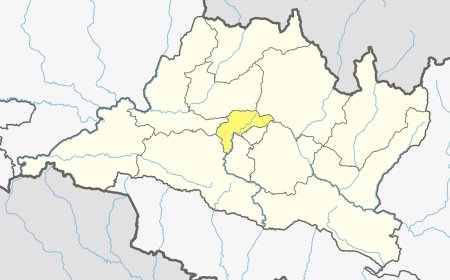TikTok Ban in Nepal: Government Takes Action on Cybercrime Concerns
TikTok ban in Nepal as the government tackles rising cybercrime issues. Stay informed on the decision's progress and its significance for online security and social harmony in the digital realm.

In a significant move, Nepal has officially announced the ban of the Chinese social media giant, TikTok, on November 13. The decision, borne out of concerns about the platform's purported negative impact on social harmony, adds Nepal to the list of nations grappling with the challenges posed by the popular video-sharing app. While the government emphasizes the need to curb rising cybercrime cases associated with TikTok, critics argue that a nuanced regulatory approach would better strike a balance between maintaining social order and upholding individual freedoms.
The decision to ban TikTok follows a surge in cybercrime cases, with over 1,600 incidents reported in Nepal over the past four years. The cabinet meeting on November 13 solidified the government's stance, with Communication and Information Technology Minister Rekha Sharma expressing the necessity of the ban to preserve social harmony. The government is now actively working on the technical aspects of the ban, with plans to implement it promptly.
This move aligns Nepal with other countries, such as India and the United States, which have previously banned TikTok, citing concerns about data privacy, security vulnerabilities, and the potential for misuse. The global scrutiny of social media platforms underscores the complex task governments face in balancing the preservation of social harmony with the protection of digital freedoms.
Criticism of the decision has arisen from various quarters, with opposition leaders and citizens advocating for a regulatory approach over an outright ban. Gagan Thapa, the general secretary of the Nepali Congress, deems the government's decision as misguided and suggests that regulating TikTok would be a more effective strategy. The ongoing debate highlights the challenges governments face in navigating the ever-evolving digital landscape.
As the ban on TikTok in Nepal takes effect on November 13, it prompts broader discussions on the implications for freedom of expression and the evolving regulatory frameworks in the digital age. Social media platforms have become integral parts of global communication, offering individuals a platform for expression, creativity, and connection. However, the misuse of these platforms for cybercrime and the spread of harmful content have led governments worldwide to reevaluate their regulatory strategies.
The decision to ban TikTok in Nepal also comes at a time when governments globally are contemplating the regulation of social media platforms to address privacy concerns, misinformation, and hate speech. The move aligns with a broader trend of nations seeking to establish control over digital spaces, urging companies to set up local offices and comply with local regulations.
While the ban on TikTok in Nepal is part of a larger global conversation, its impact on the country's digital landscape remains to be seen. As the government works on the technical aspects of the ban, questions arise about the future of digital freedoms and the role of social media platforms in shaping public discourse.
In conclusion, Nepal's decision to ban TikTok on November 13 reflects a growing trend of governments addressing the challenges posed by popular social media platforms. The move brings attention to the delicate balance governments must strike between maintaining social harmony and upholding individual freedoms in an increasingly digital world. As the ban takes effect, the broader implications for freedom of expression and evolving regulatory landscapes will undoubtedly be at the forefront of ongoing discussions within Nepal and beyond.
Disadvantages of the TikTok Ban in Nepal:
Impact on Small Businesses:
Many small businesses relied on TikTok for marketing and reaching a wider audience. The ban could adversely affect their ability to promote products and services, leading to potential economic challenges.
Currency Outflow:
With users shifting to other global platforms like Facebook, Instagram, Google, and Twitter for advertising, there's a likelihood of increased spending on foreign platforms. This could result in currency outflow from Nepal, impacting the country's economic balance.
Loss of Income Opportunities:
Individuals who earned money through TikTok, whether as content creators or through various collaborations, will face a loss of income opportunities. This could have a direct impact on livelihoods and the overall economy.
Stifling Creativity and Talent:
The ban may hinder the exposure of hidden talents and creativity that found a platform on TikTok. Content creators who were encouraged to produce innovative content might face challenges in finding alternative outlets for their expressions.
Exposure of Different Crimes:
With users feeling comfortable sharing on the platform, the ban may lead to the exposure of different types of crimes. People might be more inclined to share their experiences or report incidents, providing authorities with valuable information to address various criminal activities.
Community Problem-Solving through Donation Programs:
The absence of TikTok may encourage the public to address small-scale problems through community-driven initiatives, including donation programs. This shift could foster a sense of collective responsibility and community support for resolving local issues.
Advantages of the TikTok Ban in Nepal:
Mitigating Negative Messages:
The ban could potentially reduce the spread of negative messages and harmful content. By limiting the platform associated with cybercrime, there might be a decrease in instances of misinformation and inappropriate content.
Recommendations:
Collaboration for Content Filtering:
Instead of an outright ban, the government could explore collaboration with TikTok to implement country-specific content filters. This would allow the platform to continue functioning while ensuring that content aligns with local regulations and cultural sensitivities.
Stricter Regulatory Measures:
Implementing stricter regulatory measures could be an alternative to a complete ban. This would involve monitoring and penalizing users for engaging in cybercrime or spreading harmful content, rather than shutting down the entire platform.
Digital Literacy Programs:
Investing in digital literacy programs to educate users about responsible online behavior and the potential risks associated with certain types of content. This approach could empower users to navigate the digital space more responsibly.
Support for Alternative Platforms:
Encouraging the growth of alternative, locally developed platforms could provide users with options that align more closely with the government's regulatory requirements.
In conclusion, while addressing concerns about cybercrime and negative content is important, finding a balanced approach that considers the economic, social, and cultural impacts of a ban is crucial. Collaboration and stricter regulations could be explored as viable alternatives to a complete prohibition of TikTok in Nepal.
What's Your Reaction?







































































































